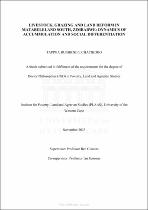| dc.contributor.advisor | Cousins, Ben | |
| dc.contributor.author | Chatikobo, Tapiwa Hushknife | |
| dc.date.accessioned | 2023-11-28T07:21:34Z | |
| dc.date.available | 2023-11-28T07:21:34Z | |
| dc.date.issued | 2023 | |
| dc.identifier.uri | http://hdl.handle.net/11394/10577 | |
| dc.description | Philosophiae Doctor - PhD | en_US |
| dc.description.abstract | This thesis examines emerging patterns and processes of accumulation and social differentiation amongst land reform beneficiaries in dryland pastoral settings in southwestern Matabeleland Zimbabwe, where livestock production predominates. While there is a growing body of literature on class dynamics and agrarian change in land reform sites in Zimbabwe, less is known about how these processes play out in dryland pastoral settings where environmental variability is the norm. This is important because most discussions of class dynamics and agrarian change in Zimbabwe are based on case studies drawn largely from relatively medium- to high-potential regions, where crop farming has come to dominate. Adopting an agrarian political economy approach, a critical realism methodology involving as suite of methods was employed to interrogate the socio-economic profile of the land reform beneficiaries, what they are producing and emerging patterns of accumulation and social differentiation. These ranged from archival, to ethnographic research and household surveys. Besides the agrarian political economy, the study also draws on the concepts of nonequilibrium rangeland and high-reliability theory to examine how livestock producers sustain their livestock in a highly variable environment. The study has revealed that processes of accumulation and differentiation are occurring amongst land reform beneficiaries in all the three types of resettlement schemes studies: A1, A2 and self-contained farms. I found that some are engaging in ‘accumulation from below’, through local production (especially in A1 schemes) while others are engaging in ‘accumulation from outside’, often linked to off-farm jobs and/or self-employed businesses (mostly in self-contained and A2 farms). However, production and accumulation are disrupted not only by environmental variability, but also by the flow of capital from outside. As a result, paths of accumulation are not linear as is often assumed in classic agrarian literature. | en_US |
| dc.language.iso | en | en_US |
| dc.publisher | University of the Western Cape | en_US |
| dc.subject | Agrarian political economy | en_US |
| dc.subject | Class dynamics | en_US |
| dc.subject | Land reform | en_US |
| dc.subject | Non-equilibrium dynamics | en_US |
| dc.subject | Zimbabwe | en_US |
| dc.title | Livestock, grazing and land reform in Matabeleland south, Zimbabwe: dynamics of accummulation and social differentiation | en_US |
| dc.type | Thesis | en_US |
| dc.rights.holder | University of the Western Cape | en_US |

